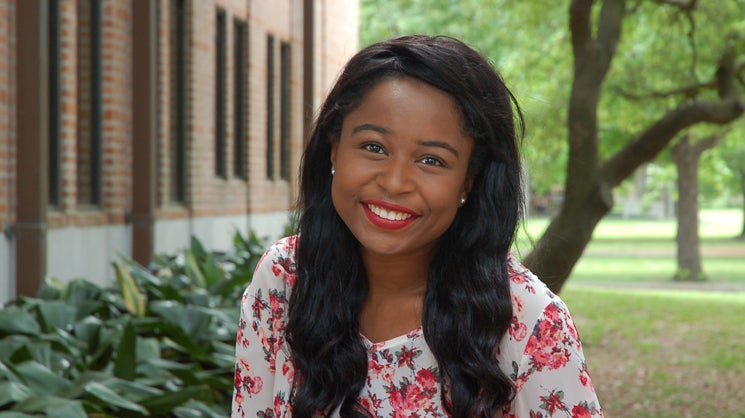“My first semester didn’t go that well,” said Naomi Eigbe, a junior computer science and psychology double major at Rice University. “It was definitely my least successful semester at Rice. High school had been easy for me and I wasn’t used to really having to apply myself in terms of studying. College is a lot of work, but when you’re not interested in the subject matter, like some of the pre-med courses I was taking, it’s even harder to apply yourself.”
Eigbe arrived at Rice intent on studying cognitive sciences and completing the pre-med track on the road to becoming a pediatric psychiatrist. Over the winter break of her freshman year, she began looking for summer internships.
“I reluctantly clicked on one that seemed too ‘techy’ but somehow showed up throughout my search process,” she said. “It was a research internship involving artificial intelligence in a social context in ways such as natural language processing, virtual humans, and interactive virtual realities. When I read through the details of the research being performed at the lab, I felt more excited by the work there than by any of the classes I’d taken so far. It was at that point that I started to consider that I might not be headed down the right path for me.”
She didn’t do the internship that summer, but it sparked her interest in changing her focus. Although she had not taken any computer science classes, her thoughts kept returning to the research field she’d discovered through that internship link.
“There were multiple reasons why I was intrigued,” said Eigbe. “Human-Computer Interaction, the focus of that lab, combines psychology and computer science. I had wanted to be pediatric psychiatrist because of my interest in the human mind – this field was just a different way of looking at it. Moreover, I was drawn to the problem-solving aspects of computer science. My younger brother had been interested in CS while I was in high school, and I remember randomly looking up related things when he was working on his projects. Yet, I didn’t consider it as a reality for me. I’d always considered CS as separate from my interests in psychology, but through discovering this internship, I learned how both of these interests could be combined.”
Although Eigbe had heard the major could be tough, she’d already spent her freshman year learning how to study better, so she enrolled in her first computer science course as a sophomore. She said, “COMP 140 placed us in teams; I was with two freshmen and I still had the least coding experience. But they weren’t so far advanced that I felt left out. It was an exciting learning process for all of us.”
She has no regrets about switching majors, even though her specific interests aren’t a research specialty area at Rice. She seeks out local faculty members who are working on related areas, like computational cognitive science.
“A research project I worked on over the past year was building an existing computational model of word recognition and determining whether the model was exhaustive enough to replicate a pattern of reading dysfunction we found in patients. These patients were able to read words but not identify individual letters. I found that the model was unable to exhibit such behavior, suggesting that review of this model may be necessary. I really appreciated that process, as it was very exciting and informative of the research process even though it wasn’t exactly under my research focus. I also really appreciated the opportunity to use computational tools to better understand a psychological issue.”
Eigbe also uses her summers as opportunities to gain more experience and knowledge at labs that focus on Human-Computer Interaction, the field she hopes to enter. Specifically, she is interested in building computational models of social and emotional behavior and using that information to build socially and emotionally intelligent machines.
“There are a variety of uses for technology like this. One project I worked on last summer at Carnegie Mellon was developing intelligent virtual peer tutors. I was helping to make them more socially intelligent and focused on how could they build rapport with students, as increased rapport has been shown to bolster the learning process. Vast income disparities impact the quality of education students across both the country and world receive, but if we had an inexhaustible source of tutors, we could create greater access to education.”
This summer, Eigbe looks to work at another lab at Carnegie Mellon. “I’m going back this year to perform research on using machine learning to analyze non-verbal behavior. I’ll specifically be looking at non-verbal behaviors, such as eye gaze and smiling, and how they be connected to suicidal tendencies in people. If we can get a computer to recognize these behaviors and link them to these tendencies, they can be utilized as powerful tools to help with intervention.”
Eigbe advises other students considering a change of majors to keep an open mind. “I came in determined on a single path, but it just wasn’t for me. I had no idea the field I’m passionate about now even existed. One of the great things about computer science is that it goes with so many things. Almost anything you are interested in, computer science can be paired with it to help learn more about it.”

